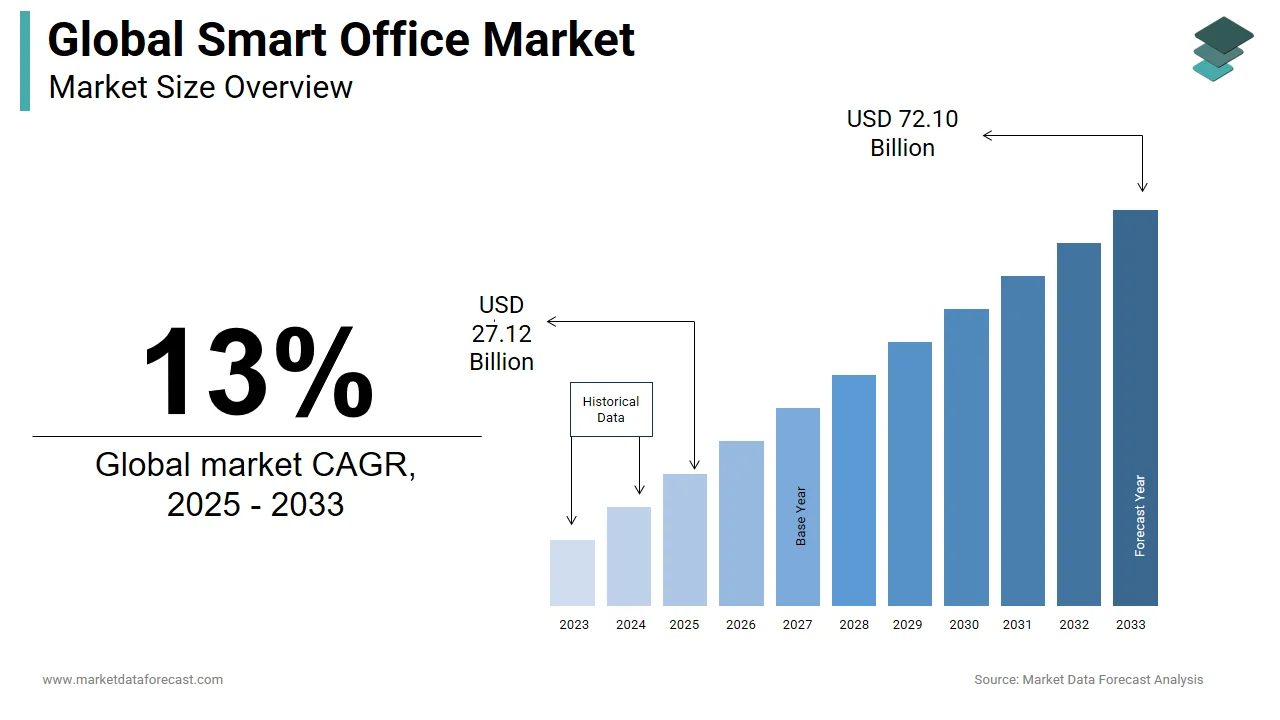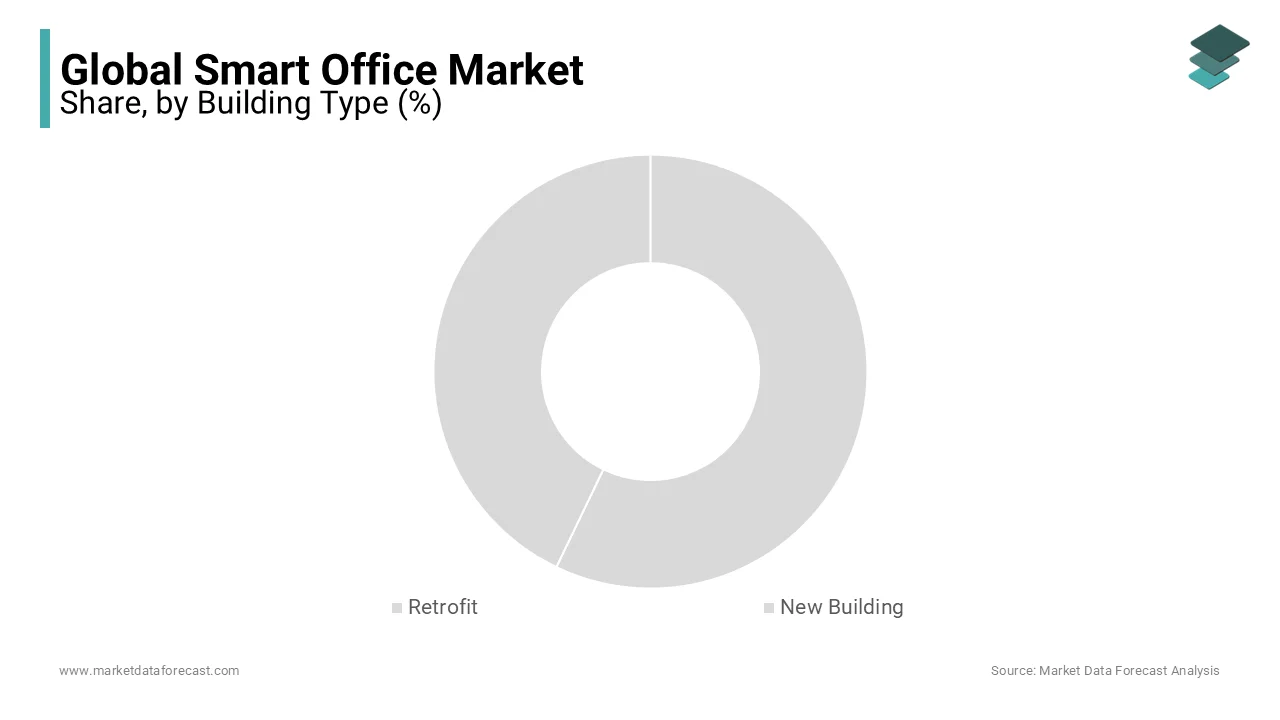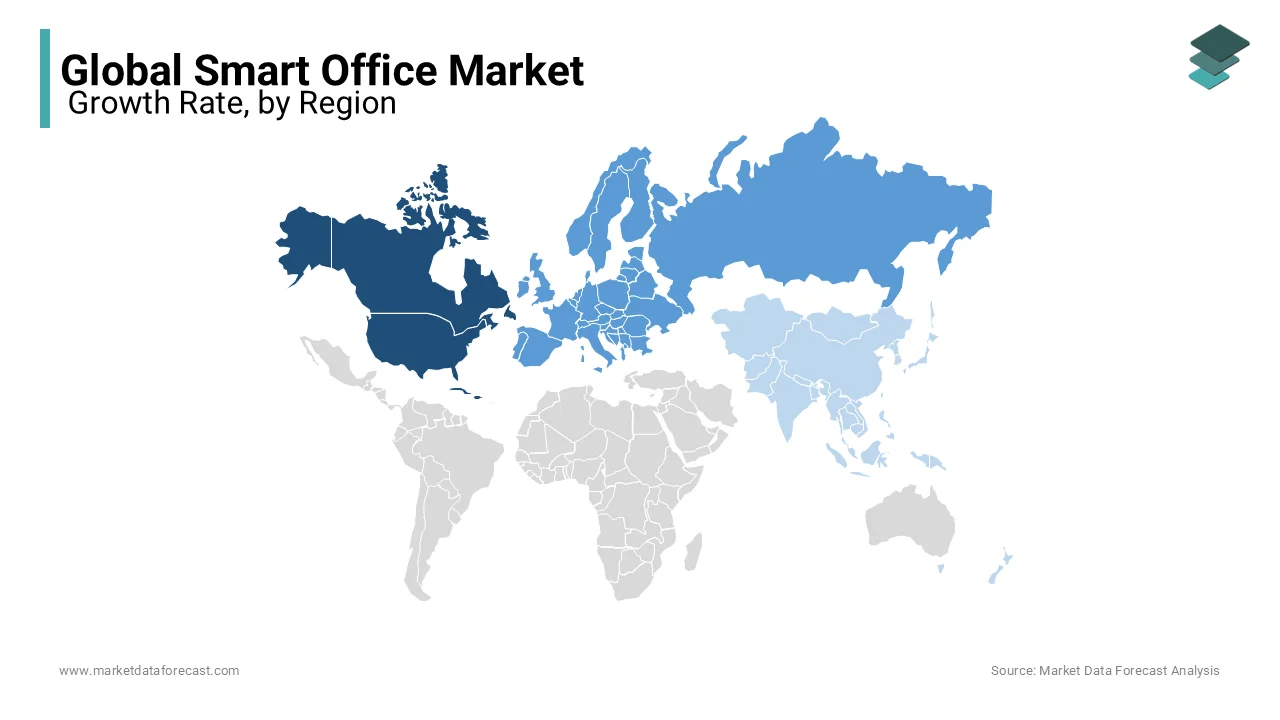Global Smart Office Market Size, Share, Trends & Growth Forecast Report – Segmented by Product (Smart Office Lighting, Security and Access Control System, Energy Management System, Smart HVAC Control System, Audio-Video Conferencing System, Fire and Safety Control System, Other Products), Building Type (Retrofit, New Building), Component (Software, Services) & Region - Industry Forecast From 2024 to 2032
Global Smart Office Market Size (2024 to 2032)
The global smart office market was worth USD 21.24 billion in 2023. The global market is projected to reach USD 24 billion in 2024 and USD 63.80 billion by 2032, growing at a CAGR of 13% during the forecast period.

Current Scenario of the Global Smart Office Market
Smart Office is a new age phenomenon combining technology into a physical office space where the organization's tasks are made simpler and versatile with network-based devices. Innovative office solutions give the organization several gains, including schedule management, cloud storage, analytics, high investment returns, cooperative communication, accurate time management, automation, higher customer satisfaction, risk management, resource utilization, identity management, and supply-connected, integrated systems. The development of the global smart office market is driven by augmenting demand for efficient commercial management solutions and sensor networks for energy efficiency, the advancement of IoT in innovative office offerings, the growing need for safety and security systems at the workplace, and favourable government regulations in various countries. The report aims to define, describe, and forecast the global office market size.
MARKET DRIVERS
Increasing demand for better commercial infrastructure to motivate employees to work is the primary factor driving the global smart office market's expansion in the forthcoming years.
The increase in the inclination to adopt energy-saving solutions at offices is another factor spurring the development of the smart office market. Also, increasing internet penetration across the globe is influencing the installation of higher and more advanced infrastructure, which provides more luxury in commercial places and contributes to the scale of the demand for the global smart office market.
An increase in the need for intelligent lighting in the commercial sector to save lots of energy costs is predicted to support the growth of the Smart Office Market during the outlook period. The ever-growing popularity of Smart Office technology is a motivational hike for manufacturers looking to take a position in research and development(R&D) activities for generating dependable, cost-effective, and improved products. The increasing acceptance of the Internet of Things (IoT) is claimed to reinforce the expansion of the market as IoT enables the inter-networking of physical devices.
REPORT COVERAGE
|
REPORT METRIC |
DETAILS |
|
Market Size Available |
2023 to 2032 |
|
Base Year |
2023 |
|
Forecast Period |
2024 to 2032 |
|
CAGR |
13% |
|
Segments Covered |
By Product, Building Type, Component, and Region |
|
Various Analyses Covered |
Global, Regional & Country Level Analysis, Segment-Level Analysis, DROC, PESTLE Analysis, Porter’s Five Forces Analysis, Competitive Landscape, Analyst Overview on Investment Opportunities |
|
Regions Covered |
North America, Europe, APAC, Latin America, Middle East & Africa |
|
Market Leaders Profiled |
Siemens AG (Germany), Schneider Electric SA (France), Johnson Controls International PLC (US), Honeywell International Inc. (US), ABB Ltd. (Switzerland), Cisco Systems, Inc. (US), United Technologies Corporation (US), Lutron Electronics Co. Inc. (US), Crestron Electronics, Inc. (US), Philips Lighting Holding B.V (Netherlands) among others. |
SEGMENTAL ANALYSIS
Global Smart Office Market Analysis By Product
Smart office lighting is one of the most prominent segments in the global smart office market that is anticipated to witness a considerable growth rate in the next few years.
Global Smart Office Market Analysis By Building Type

Most of the new commercial buildings in developed economies like the US, Germany, the UK, and others are adopting innovative technologies to conserve energy, supporting the growth of the smart offices business.
REGIONAL ANALYSIS

North America's smart office market is dominating the global business, thanks to the supply of higher technology infrastructure, especially in the USA. The smart office market in this region is also projected to exhibit a promising growth rate within the upcoming years. Europe's smart office market is the main consumption area for this technology compared to other areas worldwide. The Asia-Pacific smart office market is likely to be the fastest-growing due to the rapid adoption of modern technologies to improve energy consumption. China has the most potential market since it has a rapid growth rate of around 24%.
KEY PARTICIPANTS IN THE SMART OFFICE MARKET
The major companies operating in the global smart office market include Siemens AG (Germany), Schneider Electric SA (France), Johnson Controls International PLC (US), Honeywell International Inc. (US), ABB Ltd. (Switzerland), Cisco Systems, Inc. (US), United Technologies Corporation (US), Lutron Electronics Co. Inc. (US), Crestron Electronics, Inc. (US), Philips Lighting Holding B.V (Netherlands) among others.
RECENT HAPPENINGS IN THE SMART OFFICE MARKET
-
Siemens recently launched an IoT-enabled suite of hardware and software technologies designed to make more innovative, more flexible, human-centric working spaces within the Middle East. It was announced as a part of the company's activities at Gitex Technology Week in Dubai. The suite may be a complementary portfolio of Siemens technologies enabling office buildings to respond intelligently to user input and environmental data.
-
The new Watson IoT headquarters in Munich, Germany, is essentially the web of Things at scale. This building uses cognitive computing, meaning the building and its environment continually learn and improve to satisfy its tenants' needs. What's more, the IoT knows who is seated where and adjusts the ambient lighting and temperature to their individual preferences.
-
The intelligent room combines various innovative features to streamline and improve the meeting process for workers. A gathering management platform monitors the usage of shared office spaces like conference rooms, hot desks, phone booths, and huddle spaces. It speeds the booking process of those spaces by cataloging each room in a web booking system, which lets users look for and reserve spaces supported by size, occupancy, and room features.
DETAILED SEGMENTATION OF THE GLOBAL SMART OFFICE MARKET INCLUDED IN THIS REPORT
This research report on the global smart office market has been segmented and sub-segmented based on the product, building type, component, and region.
By Product
- Smart Office Lighting
- Security and Access Control System
- Energy Management System
- Smart HVAC Control System
- Audio-Video Conferencing System
- Fire and Safety Control System
- Other Products
By Building Type
- Retrofit
- New Building
By Component
- Software
- Service
By Region
-
North America
-
The United States
-
Canada
-
Rest of North America
-
-
Europe
-
The United Kingdom
-
Spain
-
Germany
-
Italy
-
France
-
Rest of Europe
-
-
The Asia Pacific
-
India
-
Japan
-
China
-
Australia
-
Singapore
-
Malaysia
-
South Korea
-
New Zealand
-
Southeast Asia
-
-
Latin America
-
Brazil
-
Argentina
-
Mexico
-
Rest of LATAM
-
-
The Middle East and Africa
-
Saudi Arabia
-
UAE
-
Lebanon
-
Jordan
-
Cyprus
-
Frequently Asked Questions
What technologies are most commonly integrated into smart office solutions globally?
Commonly integrated technologies in the global Smart Office Market include IoT sensors, smart lighting, HVAC control systems, and advanced communication platforms, enabling seamless connectivity and automation.
How does the adoption of smart office solutions contribute to sustainability goals globally?
Smart office solutions contribute to sustainability by optimizing energy usage through features like intelligent lighting and HVAC systems, reducing carbon footprints and aligning with global environmental goals.
What role does Artificial Intelligence (AI) play in the development of smart office solutions globally?
AI is a significant driver in the Smart Office Market, enabling features like predictive analytics, personalized user experiences, and automation, enhancing efficiency and productivity in the workplace.
How are cybersecurity concerns addressed in the implementation of smart office solutions worldwide?
Cybersecurity is a paramount concern, and global Smart Office Market stakeholders address it through robust encryption protocols, regular security audits, and the implementation of secure network architectures to safeguard sensitive data and systems.
Related Reports
Access the study in MULTIPLE FORMATS
Purchase options starting from $ 2500
Didn’t find what you’re looking for?
TALK TO OUR ANALYST TEAM
Need something within your budget?
NO WORRIES! WE GOT YOU COVERED!
Call us on: +1 888 702 9696 (U.S Toll Free)
Write to us: [email protected]